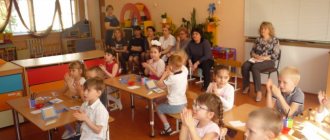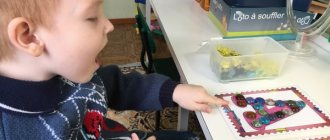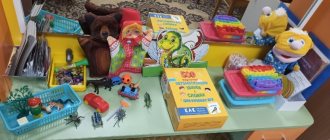One of the most important areas in the correctional and educational activities of a preschool teacher-speech therapist is working with parents as one of the conditions for optimizing the pedagogical process and socialization of a child with speech disorders. It is important to make parents active participants in the pedagogical process, to teach them to adequately evaluate and develop their child.
The survey allows us to identify the level of competence of parents in matters of children’s speech development, establish feedback, and analyze the effectiveness of the speech therapist teacher’s work with parents in the process of organizing correctional and developmental activities. In the future, this information helps in the construction and organization of the educational process.
Questionnaire for parents No. 1
Each of you wants to raise your children educated, well-mannered, and comprehensively developed. This task can only be accomplished in close cooperation between parents and teachers.
We ask you to answer the questions in the questionnaire. Please note that the survey questions already contain ready-made answers. Your task is to choose one of them.
1. Do you consider the help of a speech therapist necessary in the development of children?
• Yes. • No. • Difficult to answer.
2. Have you noticed any changes in your child’s development over the past school year?
• Yes. • No. • Difficult to answer.
3. If you noticed, what changes are these?
• Positive. • Negative. • I find it difficult to answer.
4. If you have had to take part in parent meetings, workshops, or consultations of preschool educational institutions, please select which of the statements below corresponds to your personal feeling after attending the meeting:
• It was a good conversation, although I already knew what they were talking about.
• The meeting involuntarily made me think about many things that I had not previously taken into account, and gave me an impetus to evaluate my own parental successes and failures in the development and upbringing of a child.
• I guess I wasted my time coming to the meeting.
• The speech therapist’s advice during the conversation turned out to be interesting. But it is quite difficult to follow them further, although I do not regret that I came to the meeting.
Questionnaire for parents No. 11 . Last name, initials (specify as desired)________________
2. How do you feel about your child attending speech therapy classes:
a) positive
b) negative, my child does not need special help
c) positive, but I’m embarrassed about it
d) another option (specify)__________________
3. Why do you think correcting children’s speech deficiencies:
a) because speech disorders interfere with the development of all mental processes and the child’s personality
b) because it's ugly
c) I think that there is no need to correct speech disorders, everything will go away on its own
d) another option____________________
4. Do you explain to your child why it is necessary to work on correct speech:
a) yes, otherwise he will not understand the meaning of speech therapy classes and will not try
b) I just force him to complete tasks, speak correctly
c) I don’t think it’s necessary to do this
d) another option (specify)__________
5. Do you think that the family should be directly involved in correcting speech disorders in the child:
a) yes, only by combining the efforts of a speech therapist, teacher and family can good results be achieved
b) yes, but we don’t have time for that
c) yes, but we don’t know what to do
d) no, this is the task of a speech therapist
e) another option (specify)___________
6. Which family members take part in the development of the child’s speech:
and all
b) no one
c) some (specify)_____________
7. How often do you complete the speech therapist’s tasks and recommendations:
a) always
b) when there is time
c) when there is a desire
d) when the child wants
e) another option (specify)__________
8. How often do you contact a speech therapist regarding the education, upbringing and development of your child’s speech:
a) constantly
b) only in extreme cases
c) very rarely, because I’m shy
d) I don’t need anyone’s advice, I know everything myself
e) another option (specify)____________
9. Answers to what questions regarding speech therapy work would you like to receive?:___________________
10. How do you evaluate the work of a speech therapist: ____________
11. Your comments and complaints about the work of the speech therapist:_________
12. Your suggestions, wishes for organizing speech therapy work: ___________________
Date of: ____________
Questionnaire for parents No. 2
Each of you wants to raise your children educated, well-mannered, and comprehensively developed. This task can only be accomplished in close cooperation between parents and teachers. We ask you to answer the questions in the questionnaire.
Please note that the survey questions already contain ready-made answers. Your task is to choose one of them.
1. Do you consider the help of a speech therapist necessary in the development of children?
• Yes. • No. • Difficult to answer.
2. Have you noticed any changes in your child’s development over the past year?
• Yes. • No. • Difficult to answer.
3. If you noticed, what changes are these?
• Positive. • Negative. • I find it difficult to answer.
4. If you have had to take part in parent meetings, workshops, consultations, please select which of the statements below corresponds to your personal feeling after attending the meeting:
• It was a good conversation, although I already knew what they were talking about.
• The meeting involuntarily made me think about many things that I had not previously taken into account, and received an impetus to evaluate my own parental successes and failures in the development and upbringing of a child.
• Perhaps I wasted my time by coming to the meeting.
• The speech therapist’s advice during the conversation turned out to be interesting. But it’s quite difficult to follow them further, although I don’t regret coming to the meeting.
FULL NAME. (parent)___________________________
Date of: __________________________
Questionnaire for parents No. 3
The effectiveness of correctional work as a continuous pedagogical process is largely determined by the quality and level of relationship and continuity of all its participants. The continuity of pedagogical influence in the system of work on speech disorders assumes a close relationship between the speech therapist and parents. Please fill out the form. The answers will help you evaluate the effectiveness of your work with children at home.
- Do you systematically organize activities with your child at home?
Answer: __________________
- How long does it take to teach a child at home?
Answer: ______________________
- How do you help your child?
Answer: __________________________
- How do you carry out the current correction?
Answer: ____________________________
- How do you reinforce your child's achievements?
Answer: __________________________
FULL NAME. (parent)______
Date of: ___________
Questionnaire for parents No. 4
Many years of experience of practical workers in the correction of speech disorders confirms the position that only in close contact between the speech therapist and the subjects of the educational process is the effectiveness of correctional work ensured. We ask you to take part in the survey. Please answer the questions.
- Your wishes to the speech therapist _________________
- Critical comments on organizing activities with your child._________________________
- What questions regarding speech therapy work would you like to receive answers to? Please write the scope of the questions.__________
- Do you need methodological help from a speech therapist? If yes, what help?_________________________
- Do you have the opportunity and desire to attend individual lessons with your child, parent meetings, individual consultations?
FULL NAME. (parent)____________
Date of: ____________
Questionnaire for parents No. 5
We ask you to evaluate the performance of the speech therapist over the past year. Please fill out the form.
- Are there any dynamics in your child’s speech development?
- How do you assess your child’s speech at this stage of correction?
- Did the results of the speech therapist’s correctional work coincide with the results you expected?
- Are you satisfied with the work of the speech therapist?
- Did you take part in the correction process?
FULL NAME. ____________
Date of: _________
Questionnaire for parents No. 2
The effectiveness of correctional work as a continuous pedagogical process in a speech therapy group is largely determined by the quality and level of relationship and continuity of all its participants. The continuity of pedagogical influence in the system of work on general speech underdevelopment presupposes a close relationship between the speech therapist and parents.
Please fill out the form. The answers will help you evaluate the effectiveness of your work with children at home .
1. Do you systematically organize activities with your child at home?
2. What is the duration of classes with a child at home?
3. Do you study the assignment before class?
4. How do you help your child?
5. How do you carry out the current correction?
6. How do you reinforce your child’s achievements?
Questionnaire for parents about the work of a speech pathologist teacher
Publications on the topic:
From the experience of a teacher-defectologist in a correctional group for children with visual impairments From the experience of a teacher-defectologist Olga Vladimirovna Marinina in a correctional group for children with visual impairments Work in a correctional group.
From the experience of a speech pathologist teacher in a correctional group for children with visual impairments (continued) 6. Gymnastics for the eyes. The eyes are the most important organ that must be protected from early childhood. In modern conditions this is very...
Games with elements of TRIZ technology in the correctional work of a teacher-speech pathologist with children with mental retardation. Games with elements of TRIZ technology in the correctional work of a teacher-speech pathologist with children with mental retardation. The purpose of using this technology in correctional.
Individual work of a teacher-defectologist with preschoolers. Lexical topic “Wintering birds” Development of perception Game “Guess the bird” Look at the pictures and name the birds. Game “Help the boy determine.
Office of a teacher-defectologist (typhlopedagogue.) My new products for classes with children with visual impairments. Junior group. The main task of a typhology teacher is to teach a child to consciously use his vision. At the same time, tactfully and carefully talk to the child about...
Summary of an individual lesson of a speech pathologist teacher with a 9-month-old child OBJECTIVES: 1. Expand the understanding of the surrounding world of objects and toys. 2. Develop the child’s ability to stand independently. 3. Develop.
Long-term plan for the organizational, methodological and correctional and developmental work of a teacher-defectologist. Tasks of the correctional and developmental work of a teacher-defectologist: 1. Creation of pedagogical conditions that are optimal for children with disabilities to master the Program.
Work program of a teacher-defectologist “Education and training of hard-of-hearing children of preschool age” Work program of a teacher-defectologist (sections: speech development, development of auditory perception and teaching pronunciation, formation of elementary.
Joint creative activity between a teacher-defectologist and a teacher in the preparatory group ZPR topic: “DRAWING A STILL LIFE” (from life) joint lesson between a teacher and a teacher-defectologist Turkova O.I.; Kobets S.V. Program content:.
The importance of the interaction of a teacher-defectologist with educators and a music director in the conditions of SRC When organizing the educational and correctional-developmental process, it is necessary to ensure the unity of educational, developmental and teaching.
Questionnaire for parents No. 3
Many years of experience of practical workers in the correction of speech disorders in preschool educational institutions confirms the position that only in close contact between a speech therapist and the subjects of the educational process is the effectiveness of correctional work . We ask you to take part in the survey. Please answer the questions.
1. Your wishes to the group speech therapist.
2. Critical comments on the organization of classes with your child.
3. What topics do you think need to be addressed in group consultations? Please write down the scope of the questions.
4. Do you need methodological help from a speech therapist? If yes, what help?
5. Do you have the opportunity and desire to attend individual lessons with your child, parent meetings, individual and group consultations, workshops?
Primary speech therapist questionnaire for parents, material on speech therapy
Questionnaire for parents
"Me and my child"
Dear parents! Your child has entered a speech therapy group. In order to more effectively help your child and cooperate with you on the issues of raising and educating children, I ask you to answer the questions:
1. Last name, first name, patronymic of the child_________________________________________________ 2. Date of birth_______________________________________________________________ 3. Home address (telephone)__________________________________________________________ 4. Last name, first name, patronymic of the mother, place of work and telephone number______________________________________________________________________________ 5. Last name, first name, patronymic of the father, place of work and telephone number _______________________________________________________________________________ 6 What does your child like to do most?_________________________________7. What worries you most about your child's development?
• Pronounces sounds incorrectly
• Speech is incoherent, cannot retell the story, gets confused
• I'm afraid that we won't have time to get ready for school.
• Does not like to listen to fairy tales, stories
• Doesn’t like to study at home
• Other________________________________________________________________________________
8.What characteristics of your child, in your opinion, require correction or development (attention, imagination, memory, perseverance, communication skills, sound pronunciation, coherent speech, vocabulary, literacy, etc.)? ______________________________________________________________________________ 9. How do you feel about the fact that your child is studying in a speech therapy group:
• positive
• negative, my child does not need special help
• positive, but I’m embarrassed about it
10. What characteristics of a child’s character, in your opinion, should teachers take into account (for example, irritability, tearfulness, anxiety, impressionability, vulnerability, etc.)___________________________________________11. Please provide the child's medical history:
From which pregnancy __________________Nature of pregnancy _______________
Childbirth ____________________ Past illnesses ___________________________________
Hearing ___________________________ Vision ____________________ Intelligence _______________
Previous physical health:
began to hold his head _______________ sit_________________ crawl ___________________
stand _______________________________________ walk _________________________________
Early speech development:
humming _______________________ babbling ______________________first words _______________
first phrase ___________________________________ phrasal speech ________________________________
• child’s leading hand (right, left, ambidextrous)______________________________
12. Before entering the speech therapy group, did you pay attention to the child’s difficulties in speech development?
•Yes
•No
13. Have you previously sought speech therapy help? If yes, then where and the effectiveness of the classes. ______________________________________________________________
14. Are you interested in working together with a speech therapist?
| Yes | 1 | 2 | 3 | 4 | 5 |
| No | 1 | 2 | 3 | 4 | 5 |
15. Does the child notice difficulties in speech development?
| Yes | Sometimes | If you remind him | No |
16. Do you explain to your child why it is necessary to work on correct speech:
a) yes, otherwise he will not understand the meaning of speech therapy classes and will not try
b) I just force him to complete tasks, speak correctly
c) I don’t think it’s necessary to do this
d) another option (specify)__________________________________________________________
17.Are you ready to take part in joint activities with children?
| Yes | Sometimes | No |
18. What forms of work do you consider the most effective?
- Parent meetings
- Attending classes
- Joint activities and holidays
- Individual conversations and consultations
- Information stand, booklets, reminders
- Speech therapy toy library
19. Does it bother you if your child speaks incorrectly at a party?
• No
• Yes
• Confusing, but it’s better to let him perform
• I wouldn’t want my child to be a soloist on stage until he learns to speak correctly
• Another answer____________________________________________________________
20. Your suggestions on forms of work. What forms of work would you like to take part in? __________________________________________________________
____________________________________________________________________________
21. Who, in your opinion, plays the leading role in raising children?
- Family
- Kindergarten
- Together
22. Who in your family is responsible for raising the child? _________________________
23. Do you read books to your child?
• Yes
• When I have time
• Sometimes
• No
24. Does your home library have special literature on speech development?
• Yes
• No
25. From what sources do you get knowledge about raising a child?
• MASS MEDIA;
• special books on pedagogy;
• conversations with friends and acquaintances;
• conversations with teachers
• other ________________________________________________________________________________
Thank you for your cooperation!!
Card index of questionnaire forms for parents of preschool children during the adaptation period
Card index of questionnaire forms for parents
during the adaptation period
APPENDIX 1.
Questionnaire for parents.
Dear parents! We invite you to take part in the questionnaire survey. Your answers will help the kindergarten staff better understand the characteristics and desires of your child - to create favorable conditions for his development.
- Child:
Full name_______________________________________________________________________________ Date of birth_________________________________________________________________ Home address, phone number_________________________________________________________________________
- Mother:
Full name__________________________________________________________________________ Year of birth__________________________________________________________________ Education, specialty, place of work_________________________________________________________ __________________________________________________________________________ Father: Full name ________________________________________________________________________ Year of birth________________________________________________________________ Education, specialty, place of work__________________________________________________________ __________________________________________________________________________
- Family composition (who permanently lives with the child)_____________________________________________
__________________________________________________________________________
- Are there other children in the family, their ages, what is the relationship with them_______________________________________________________________________________________________________________________________________________
- To which family member is the child more attached?________________________________________________
__________________________________________________________________________
- How often does the child get sick, what serious illnesses or injuries has he suffered?
__________________________________________________________________________ __________________________________________________________________________
- Main types of games and activities at home______________________________________________________________
__________________________________________________________________________ 9. What toys does he like, who cleans them _______________________________________________________ __________________________________________________________________________ Is he willing to make contacts and communicate (underline as appropriate): - with children of his own age yes no
- with older children
yes no
- with unfamiliar adults,
yes no
- with relatives
, yes no
11. How do you consider your child (underline): - calm; low-emotional; very emotional 12. What can a child do independently________________________________________________________________ __________________________________________________________________________
- What routine tasks give you the most difficulty at home (underline as appropriate): getting up, washing, feeding, putting to bed, other (fill in)________________________________________________________________________________
- What kind of appetite does your baby have (underline as appropriate): good; eats everything; bad and little; depending on what's on the plate.
How do you feed him at home (underline as appropriate): he eats himself; first he eats himself, then we feed him; more often he is spoon-fed by adults; eats carefully; not very neat; we ensure that he eats everything that is given; we allow him not to eat what he does not want; let him eat as much as he wants; the plate must be clean.
- How does a child fall asleep at home (underline as appropriate): quickly; slowly; myself; one of the adults is sitting next to him; sometimes urinates in his sleep; undresses himself before going to bed; dresses himself after sleep; he is undressed and dressed by adults.
Thank you!
APPENDIX 2
Questionnaire for parents: “Is your child ready to enter kindergarten?” F.I.
child ___________________________________________________________________
1. What mood prevails in the child?
a) cheerful, balanced b) irritable, unstable c) depressed
2. How does a child fall asleep?
a) quickly (up to 10 minutes) b) slowly c) calmly d) not calmly
3. What do you do to make your child fall asleep?
a) additional influences _____________________________________________ (which ones?) b) without additional influences
4. What is the duration of a child’s sleep?
a) 2 hours b) less than an hour
5. What is your child’s appetite?
a) good b) selective c) unstable d) bad
6. How does your child feel about being put on the potty?
a) positive b) negative c) does not ask, but is dry d) does not ask and is wet
7. Does your child have negative habits?
a) sucks a pacifier, sucks a finger, rocks, others __________________________ (specify) b) no negative habits
8. Is your child interested in toys, objects at home and in a new environment?
a) yes b) no c) sometimes
9. Does the child show interest in the actions of adults?
a) yes b) no c) sometimes
10. How does your child play?
a) knows how to play independently b) not always c) does not play on his own
11. Relationships with adults:
a) easy to make contact b) selectively c) difficult
12. Relationships with children:
a) easy to make contact b) selectively c) difficult
13. Attitude to classes (attentive, diligent, active)?
a) yes b) no c) not always
14. Does the child have experience of separation from loved ones?
a) yes b) no c) suffered the separation easily d) hard
15. Is there an affective attachment to any of the adults?
a) yes b) no
THANK YOU FOR YOUR COOPERATION!
APPENDIX 3
Questionnaire for parents: “Is your child ready to enter kindergarten?” Instructions
: You can assess your child’s readiness for kindergarten yourself by answering the following questions.
1) How does the child behave when communicating with adults?
a) communicates easily b) shows interest c) hides
2) Does the baby know how to occupy himself?
a) Yes, and plays in a variety of ways b) sometimes c) only in my presence
3) Does the child strive for independence?
a) yes, he wants to do everything himself b) sometimes c) he doesn’t care
4) How does a child show interest in other children?
a) plays with them b) watches them play c) fights, takes away toys
5) Does the baby have self-service skills?
a) yes b) partially c) no
For each answer a) give 5 points, for b) - 3 points, c) - 0 points
.
20 points and above
– a high degree of readiness.
from 15 points
– average,
less than 15 points
– low.
APPENDIX 4 Primary observation at the time of admission to the orphanage
Last name, first name of the child, age _____________________________________ date of admission to the orphanage __________________________________
Mood (low, high, emotions, affects, depression, euphoria, etc.) ___________________________________________________________________________ Activity (active, passive, purposeful actions, manifestations of volitional activity_________________________________________________________________ Movements (disinhibited-inhibited, coordinated-uncoordinated, purposeful-chaotic)________________________________________________________________ Contact (easy enters and maintains contact or not, comes into contact himself or with the help of an adult, with whom it is easier to establish contact: with children or adults) ________________________________________________________________________________ Understanding of questions, requests, responses to questions (adequate or not) ________________________________________________________________ Speech (understandability, coherence, behavior in conversation)_______________________________ Orientation in the environment (ideas about oneself, about the environment, ability to reason, etc.)__________________________________________________________ Interests (in children, adults, in toys, etc.)______________________________ Additions____________________________________________________________. DATE OF COMPLETION
__________________________
PSYCHOLOGIST
_____________________________ APPENDIX 5
Questionnaire for parents “Kindergarten through the eyes of parents”
Purpose of the questionnaire
– adapt the work of the institution to the needs of your child. It is anonymous, so we ask you to answer the questions asked sincerely.
1. Who, in your opinion, is more responsible for raising a child - a family or a preschool educational institution? ______________________________________________________________ 2. What would you like to get from kindergarten? - The most complete information about the child - Pedagogical advice on communicating with him - Psychological consultations - Recommendations on what literature about raising a child of your age is best to read - The opportunity to communicate more with the parents of other children - Participate in kindergarten events - Other... 3. What kind of parent meetings , meetings, excursions do you propose to hold this academic year? ________________________________ 4. Would you like to attend classes with your child? What activities? For what purpose?__________________________________________________________ ___________________________________________________________________________________________________________________________________ 5. What do you expect from such visits?________________________ ___________________________________________________________________ 6. Do you have difficulty communicating with kindergarten staff? If so, why? ______________________________________________________________ 7. Your wishes and comments in the work of the kindergarten_____________
APPENDIX 6 Questionnaire for parents
| Relation degree | FULL NAME. | Year of birth | Education | Place of work | Job title | Slave . Tel. |
| Father | ||||||
| Mother | ||||||
| Brother | ||||||
| Sister |
- Who does he live with?
child?___________________________________________________
- Home address
__________________________________________________________
- House. Telephone
_____________________________________________________________
- Living conditions of the child’s life (general conditions, conditions for play, recreation and activities)
_______________________________________________________________________ _______________________________________________________________________
- Range of family interests
_______________________________________________________ _______________________________________________________________________
- Features of family upbringing (strict attitude, tolerant attitude,
a child can do everything, etc.) _____________________________________________________ _____________________________________________________________________
- What difficulties in raising you
are you experiencing?_________________________________
APPENDIX 7 QUESTIONNAIRE FOR PARENTS
Dear parents! We invite you to take part in the questionnaire survey.
Your answers will help the kindergarten staff better understand the characteristics and desires of your child - to create favorable conditions for his development. Child's full name:
________________________________________________
___________________ Date of birth_______________________________________________________________ Home address, phone number_________________________________________________________ Mother: Full name__________________________________________________________________________ Year of birth______________________________________________________________ Education, specialty, place of work_____________________________________________ Father: Full name__________________________________________________________________________ Year of birth_______________________________________________________________ Education, specialty, place of work_________________________________ Family composition (who permanently lives with the child)_______________________________________ ________________________________________________________________________________ Are there other children in the family, their age, what is the relationship with them___________ ________________________________________________________________________________ Which family member is the child more attached to?________________________________ ________________________________________________________________________________ How often does the child get sick, what serious illnesses and injuries has he suffered_______________ ________________________________________________________________________________ Main types of games and activities at home________________________________________________ ________________________________________________________________________________ What toys likes who cleans them up __________________________________________ __________________________________________________________________________ Does he willingly enter into contacts, communicate (underline as appropriate): - with children of his own age, yes no - with older children, yes no - with unfamiliar adults, yes no - with relatives, yes no What do you consider your child to be (underline) : - calm; low-emotional; very emotional What can a child do on his own ________________________________________________ __________________________________________________________________________ What routine moments give you the most difficulty at home (underline as necessary): getting up, washing, feeding, putting to bed, other (add)________________________________________________________________
- What kind of appetite does your baby have (underline as appropriate): good; eats everything; bad and little; depending on what's on the plate.
- How do you feed him at home (underline as appropriate): he eats himself; first he eats himself, then we feed him; more often he is spoon-fed by adults; eats carefully; not very neat; we ensure that he eats everything that is given; we allow him not to eat what he does not want; let him eat as much as he wants; the plate must be clean.
- How does a child fall asleep at home (underline as appropriate): quickly; slowly; myself; one of the adults is sitting next to him; sometimes urinates in his sleep; undresses himself before going to bed; dresses himself after sleep; he is undressed and dressed by adults.
Thank you!
APPENDIX 8
“How did the baby adapt?” DEAR PARENTS! We ask you to answer the questions in this questionnaire. It is not necessary to write your full name. Place “+” next to the correct answer, and if you find it difficult to answer, move on to the next question. Your thoughts will help organize the successful adaptation of children entering our kindergarten, change something, look at something with different eyes. 1. How did the child’s adaptation to kindergarten go: A) the child adapted completely B) the child in the morning does not want to go to kindergarten C) the child sometimes does not want to go to kindergarten D) the child in the evening expresses a desire to play more in kindergarten 2. How it proceeded Adapting your baby to kindergarten?
The child went to kindergarten:
A) crying B) with persuasion C) without emotions D) with pleasure 3. What, in your opinion, influenced the successful adaptation: A) actions of all employees B) joint actions of employees and parents C) actions parents 4. What was your child’s behavior after the first days of visiting kindergarten: A) normal B) refused to eat C) had trouble falling asleep D) was very depressed E) full of impressions E) all these factors took place 5. What do you think are the ways to successfully adapt to kindergarten?
What do you think needs to change? What would you like to see in kindergarten? Your wishes ________________________________________________________________________________________________________________________________________________________________________________________________________________________________
Thank you!
Questionnaire for collecting anamnestic data about the child
Questionnaire for collecting anamnestic information.
Dear parents!
Fill out the form, highlighting the ready-made answer options and entering the missing ones
.
1. Last name, first name of the child________________________________________________________________ 2. Date of birth, number of years at the time of examination ___________________________________ 3. Diagnosis________________________________________________________________________________
4.Name of parents (age of parents at birth of child)_________________________________
_______________________________________________________________________________________
______________________________________________________________________________________________________________________________________________________________________________
5. Education and profession of parents______________________________________________________________
______________________________________________________________________________________________________________________________________________________________________________ 6. Family composition _______________________________________________________________________________
7. Who is the child with most (mom, dad, grandma, grandpa, nanny, other)____________
8. Contacts (tel.)__________________________________________________________________________ 9. Parental complaints_________________________________________________________________________ 10. Heredity:
presence of alcoholism in parents
· neuropsychiatric diseases of parents;
_____________________________________________________________________________
11. Pregnancy and childbirth
:
· from which pregnancy the child was born _____________________________________________
· chronic somatic diseases during pregnancy _____________________________________________
· Were there any complications during pregnancy: toxicosis, threat of miscarriage, stress, infection ________________________________________________________________________________
· falls, physical injuries of the 1st, 2nd half of pregnancy; physical overload______________________________________________________________________________
· intrauterine fetal hypoxia;
· taking medications during pregnancy__________________________________________
Planned pregnancy (yes, no)
· IVF__________________________________________
12. Childbirth______________________________________________________________________________
· urgent birth, premature (_____), rapid labor (≈ 3 hours), with stimulation, caesarean section (planned, unplanned), normal __________________________________________________________________
· long (more than 12 hours) waterless period_________________________________
· Was obstetric care provided and what kind ___________________________________________
· presence of hypoxia or asphyxia during childbirth (white, blue skin of the child)______________
· pathology of the placenta_______________________________________________________________
· injuries during childbirth______________________________________________________________
· umbilical cord entanglement, breech presentation_________________________________
· number of points on the Apgar scale__________________________________________________________
· Weight and height at birth_________________________________________________________________
· Was there jaundice_______________________________________________________________________________
· On what day was he discharged?________________________________________________________________
· Hospitalization, in connection with which_______________________________________________________________
· shouted immediately; after a spanking; after resuscitation measures. shouted loudly, quietly;
· attached to the chest (immediately, for ____ day);
· breastfed (artificially) fed until _____________________________________________
_______________________________________________________________________________
13. Development period up to 1 year.
· sleep, appetite, difficulties in establishing a routine _______________________________________________________________________
· infectious diseases ________________________________________________________
· bruises, head injuries (age) ____________________________________________________________
Frequent choking during feeding and regurgitation________________________________
· Was there a special massage, for what purposes __________________________________________
· time of formation of the skill of holding the head (2, 3, 4, 5 months)________________________
· time of formation of sitting skill (6, 7, 8, 9 months)________________________________
· time of formation of crawling skill (6, 7, 8, 9,10 months) _______________________________
· time of formation of walking skill (10, 11.12, 1.1, 1.2, 1.3 months _____________________-
14. Did the child have any illnesses accompanied by high fever? Which ones and at what age?_______________________________________________________________________________ 15. What strong drugs did the child take? At what age?________________
_______________________________________________________________________________________
16. Underline what you need. The child has: bronchial asthma, allergies, metabolic disorders, heart failure, frequent pneumonia, nephropathies, other diseases ________________________________________________________________________________________________
17. Was there hospitalization, at what age, for what reason _______________________________________________________________________________________________________________________________________________________________________________
18. Early speech development. Features of the cry (underline what is appropriate): nasal, shrill, quiet, normal, choking______________________________________________________________________________
· time of appearance of humming and hooting _____________________________________
· time of appearance of babbling__________________________________________________________
· time of appearance of the first words (what words)___________________________
· time of appearance of the first phrases (which phrases)___________________________
19. Have you previously had classes with a speech therapist, the results_________________________________
_______________________________________________________________________________________ 20. Main character traits: calm - excited; mobile - slow, balanced - capricious_________________________________________________________________________
21. Main behavioral traits: capriciousness, spoiledness, tearfulness, anxiety, fears (what)_____________________, negativism, exhaustion, disinhibition, difficulty switching, communication problems ______________________________________________________________________________________________
22. At what age does one go to the potty_______________________________________________________________
23. Are there any peculiarities of sleep and nutrition_______________________________________________________________
24. How does he react to his mother’s care?__________________________________________________________
25. Was there a setback in development and what was it associated with__________________________________________________ 26. What types of encouragement are there in the family_________________________________________________ 27. Features of verbal communication:
How often are books read to a child, and what kind of books are they?
· Are you learning poetry with your child?__________________________________________________________
· total amount of time watching TV per day________________________________
· do they play with the child in the family, and how?_________________________________________________
28. Does the child use the computer? For what purpose? How much time per day? __________________________________________________________________________________________ 29. What games does the child like to play?__________________________________________________________ 30. Prefers to play alone or in a group of children_______________________________
31. Imitates someone or something_________________________________________________ _______________________________________________________________________________________
32. How does he react to punishments and rewards________________________________________________________________
33. Where was the child raised or educated before school:
· in a general education kindergarten (nursery);
· in a speech therapy kindergarten;
· at home;
· attended short-term groups;
· attended separate classes in children's centers.
34. Is the child willing to go to school_______________________________________________________
35. In what subjects is he more successful?__________________________________________________________
36. What subjects cause difficulties_________________________________________________________
37. Your wishes_______________________________________________________________________________
38. How do you evaluate yourself in terms of raising a child (1, 2, 3, 4, 5 points) ________________________________________________________________________________________________
All information provided will be strictly confidential.
Thanks for the help!






